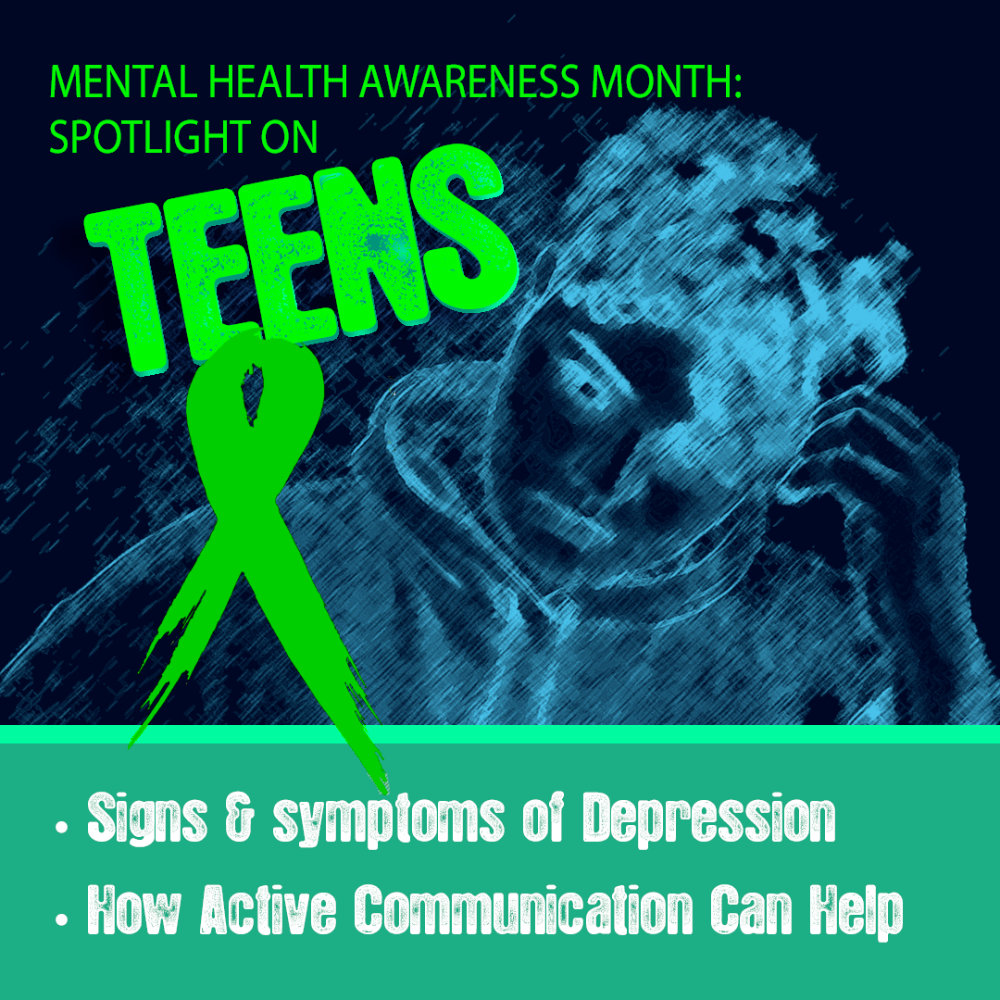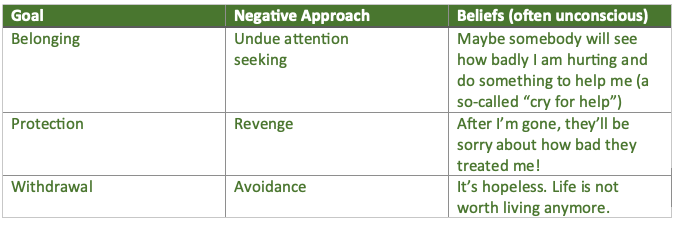
04 May Mental Health Awareness Month: Spotlight on Teens
May is Mental Health Awareness Month
Mental Health Awareness Month was established in 1949 to create awareness of the tremendous impact mental health has on our well-being. According to the Substance Abuse and Mental Health Services Administration SAMHSA, mental health “includes our emotional, psychological, and social well-being. It affects how we think, feel, and act, and helps determine how we handle stress, relate to others, and make choices.” For this Mental Health Awareness Month, our spotlight is on teens as this group is largely affected and we at Active Parenting have tools to help.
Teen Depression and Suicide
Unfortunately, many teens experience depression and feelings of sadness or hopelessness. In fact, The CDC reported that in 2021, [1]“Nearly 60% of female students and nearly 70% of LGBQ+ students experienced persistent feelings of sadness or hopelessness. 10% of female students and more than 20% of LGBQ+ students attempted suicide.” The CDC also found that “In 2021, 42% of high school students felt so sad or hopeless almost every day for at least two weeks in a row that they stopped doing their usual activities.” Teens suffering from depression have become so discouraged trying to cope with mounting pressures that they experience a persistent mood change resulting in overwhelming feelings of sadness, despair, or anger. They see no hope for happiness or success, and as a result, their chances of achieving happiness and success are greatly diminished. Left untreated, depression can escalate into problems at school, home, and even in the community, including drug use as a means of self-medicating, suicide, and other forms of violence to one’s self and to others.
The Signs and Symptoms
Although depression is a highly treatable condition, too many parents miss the warning signs or misread depression as just another phase of adolescence. Depression is more than a prolonged bout of moodiness or sadness. Parents, Leaders, and anyone working with teens should be on the lookout for the following symptoms:
- Persistent sadness or hopelessness

- Irritability, anger, or hostility
- Frequent crying
- Apathy (not caring)
- Withdrawal from most friends or family
- Loss of interest in friends or activities
- Negative changes in eating or sleeping habits
- Restlessness and agitation
- Lack of energy
- Feelings of worthlessness or guilt
- Difficulty concentrating
- Unexplained aches and pains
- Extreme sensitivity to criticism
- Mentions of suicide or death
Communication is Key
If a number of these signs are present, it is important to open a dialogue with the teen using the communication skills presented in the Active Parenting of Teens Parent’s Guide. Here are some effective communication skills:
- Avoid communication blocks like judging, psychologizing, interrogating, placating, giving advice, commanding, distracting, being sarcastic, moralizing, being a know-it-all, focusing on mistakes, negative expectations, or perfectionism
- Use the 5 STEPS of ACTIVE COMMUNICATION:
- LISTEN ACTIVELY by giving full attention, keeping your own talking to a minimum, acknowledge and reflect what you’re hearing, and listen with empathy
- LISTEN FOR FEELINGS. Teens need to acknowledge and accept their feelings rather than keep them bottled up. Teach teens to describe how they feel but until they learn this “emotional intelligence”, listeners will have to watch body language and listen to tone of voice for more clues.
- LOOK FOR ALTERNATIVES AND EVALUATE CONSEQUENCES. Teens are likely to choose the first solution that comes to them without pausing to consider the pros and cons of other options. A parent’s role is to slow their teen down and help them to look at alternative options and the consequences of each. Avoid solving the problem by saying things like “Here’s what you should do”, instead leave the decision to the teen. A parent can say things like “I don’t know what you will decide to do, but let’s look at your options”.
- OFFER ENCOURAGEMENT. Once a teen has a potential solution to their problem, a word of encouragement from the parent can help give them the courage to put it into action. For example a parent can say, “You really thought that through, that sounds like a good idea!”
- FOLLOW UP LATER. A follow-up helps the teen learn from the experience and validates that the parent’s interest was genuine. If the results were good, then a little praise for the way the teen handled the situation reinforces their positive experience. However, if the problem still exists, or if new ones were created, then parents can begin the Active Communication process over again to help their teen find another solution.
For a more complete guide to these helpful communication skills see Chapter 2 of the Active Parenting of Teens Parent’s Guide. Parents can also find an Active Parenting of Teens class nearby or online and Leaders can find an Active Parenting of Teens workshop to explore these concepts more in-depth. There are also classes for Parents and Teens together called Families in Action! And remember, it’s not just the words but the tone of voice and body language that convey a message from both parties.
Parents need to be gently persistent and expect some denial when talking with their teen about how they are feeling and what is upsetting them. If there is a particular problem that is triggering the depression, parents may be able to support their teen in finding a solution. However, if the depression seems deep or more general, parents can set up an appointment for an evaluation with their family physician or a mental health professional who specializes in adolescents.
Suicide Prevention
Suicide is the third leading cause of death among 15- to 24-year-olds, according to research from the CDC (Centers for Disease Control), even though a large majority of suicide attempts are not successful. Why are suicide attempts so common among teens? Like any problem behavior, a suicide attempt may be a means to achieving any of the five goals of behavior. However, it is most often associated with one of these three:

In addition to the signs of depression, the following warning signs indicate a risk of suicide:
- Talking or even joking about committing suicide
- Expressions of hopelessness: “I might as well be dead.”
- Glorifying death: “I bet people will remember me after I’m gone.”
- Having a lot of accidents or engaging in reckless behavior
- Giving away favorite possessions (preparing for death)
- Saying goodbye to friends and family
- Seeking out weapons, pills, or other ways to commit suicide
If a teen is threatening to commit suicide, call a suicide hotline 988 or 911. In a non-emergency situation, such as a teen exhibiting signs of depression, parents can contact their family physician or a mental health professional. Parents can be a big part of the solution but should not try to do it all by themselves. Parents should remember to take care of themselves as well.
Mental Health Is Important for Everyone
Our spotlight is on teens for this Mental Health Awareness month, but everyone needs help at one time or another. Leaders and parents need to take care of themselves in order to be effective advocates for children of all ages. Dr. Miriam Delphin-Rittman, Assistant Secretary for Mental Health and Substance Use, US Department of Health and Human Services would like everyone to know “that people with mental health conditions can experience recovery and live full, whole, meaningful lives, and we can all play active roles in caring for our mental health. Practicing self-care, asking for help when needed, and checking in with ourselves and people around us all can make a difference.”
Dr. Delphin-Rittman advises going to findtreatment.gov if you are looking for help and if you or someone you know is in crisis, call or text 988 or chat 988lifeline.org. The Lifeline provides 24/7, free and confidential support for people in distress or who need crisis resources for loved ones. Click here to see her video from SAMHSA. Imagine what our communities would look like if we all practiced self-care and showed empathy for others.
Sources:
Additional Resources:
- 988 Suicide & Crisis Lifeline “We can all help prevent suicide. The Lifeline provides 24/7, free and confidential support for people in distress, prevention and crisis resources for you or your loved ones, and best practices for professionals in the United States.”
- A Proclamation on National Mental Health Awareness Month, 2023 from President Biden
- From the American Psychological Association Kids’ mental health is in crisis. Here’s what psychologists are doing to help: Research is focused on child and teen mental health, exploring why they are struggling and what can be done to help them By Zara Abrams (January 1, 2023)
[1] Youth Risk Behavior Survey: Data Summary & Trends Report from the CDC
Active Parenting Publishers founder and president Michael H. Popkin, Ph.D. has been providing research-based education programs with an emphasis on nonviolent discipline, mutual respect, and open communication for 40 years. He is widely known for his expertise in the field of parent education and has appeared on over 100 TV programs, including CNN and The Oprah Winfrey Show.
STAY IN TOUCH!
Click here to receive the latest news and offers from Active Parenting! And follow us on social media:


